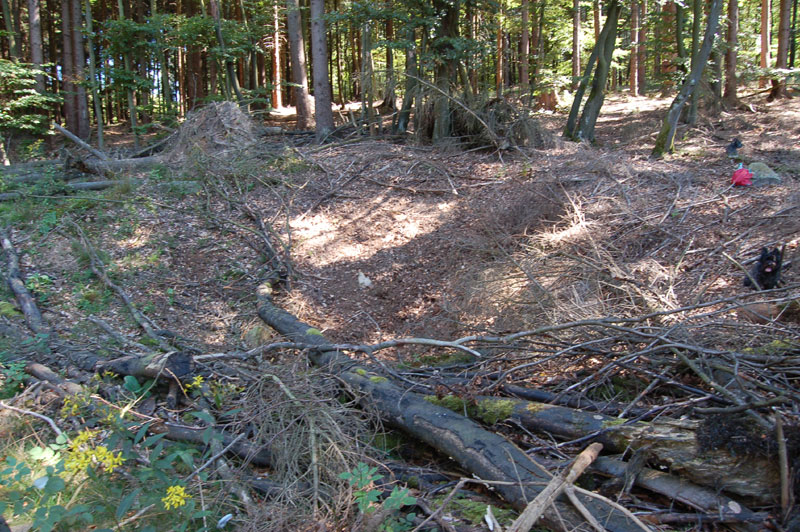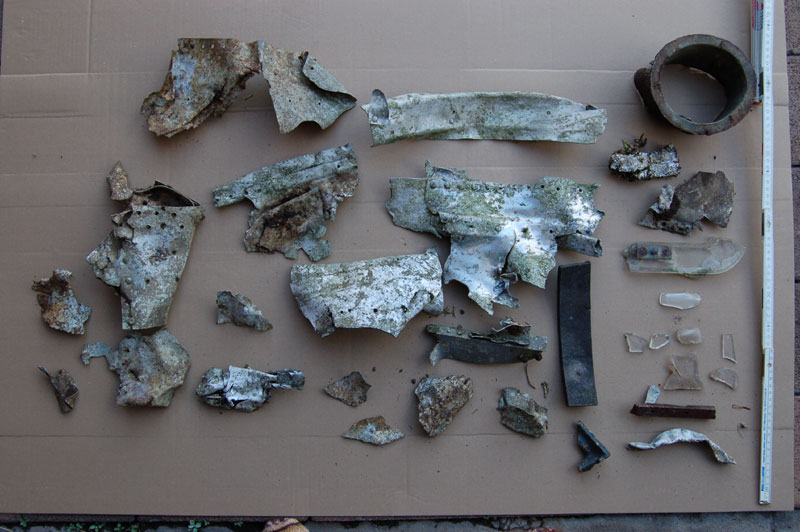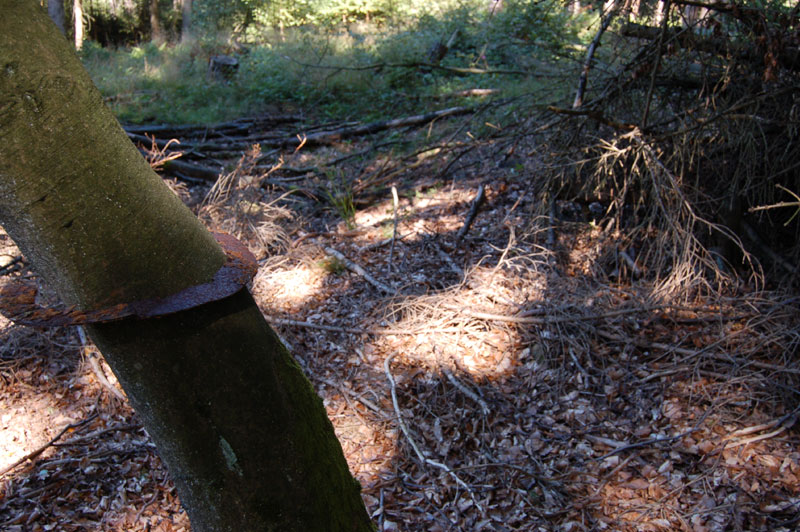My name is Thomas McCord, I am 56 years old, and by profession a
geologist, I work for the State Building Office of Rhineland-Palatinate in
Germany and live in the Hunsrueck-Hills, an area between Bingen, Koblenz
and Saarbruecken.
I came into contact with Chester Klier and the B26 website through the
following succession of events:
In 1990, while I was working near the village of Kempfeld in a logging
operation, I came across a large number of smaller sized aluminum and
Plexiglas debris, rubber tire fragments with waffle-iron tread, rubber
hoses (stenciled 1944) scattered around the forest. I also located a
depression or crater and after digging there unearthed a number of bullets
and further pieces of Plexiglas and parts of panels, with wires attached.
I also found a small oval plaque reading "Glenn L. Martin Aircraft Company,
Baltimore, Maryland, Left Venturi Panel".

The disturbing fact for me in 1990 and still is today, the additional
finding of fragments of a parachute, still folded, with sharp creases,
undoubtedly undeployed, which can only mean: there either was a spare
parachute on board, or the plane went down and some of the crew didn't get
out.
At that time I asked the locals about the plane, and one of the older
lumbermen recalled, that an allied plane had been shot down by FLAK
(stationed nearby) in 1944 or 1945 and burned or exploded prior to
crashing. That was the only eyewitness account I had on the incident.
Also at that time, about 1991, I did some book-research into allied planes
of WW II and that, together with the assorted debris and especially the
above mentioned plaque, suggested strongly that the crashed plane might
have been a B 26 Marauder.
That was all I found out then in 1991, and it seemed to me, to be a dead
end.
In around about 1992/1993 I made the acquaintance of a retired Bundeswehr
(German Airforce) Pilot who was involved loosely in the investigation of
plane crashes of WW II and he thought he would maybe be able to turn up
some more information on the airplane that crashed near Kempfeld and the
fate of the crew. After a while I lost track of him and the parts and the
matter dropped from my mind, for a while……
The disturbing recollection of the folded piece of parachute always popped
up in my mind once and awhile in the many following years, but, not
lacking determination, I always failed to find my way back to the crash
site.
All this was before internet as we can comfortably use today.
This summer in July/August the “anonymous airplane” popped up again and
remained on my mind, so, after a thorough desk research utilizing
high-resolution recent air photos from which I could narrow down probable
locations, I embarked on a hike of the area on August 7, 2011 and
succeeded in finding the crash site again.
I could retrieve a few pounds of riveted aluminum (still shiny in places)
paneling, Plexiglas fragments, and rubber tank fragments, all without
markings, located in a larger area around the perimeter of a depression or
crater, identical to the situation in 1990, when I found the first debris.

There is one smaller tree that actually grew through one circular ring
shaped part and raised it about 3 feet off the ground.
The area is still a rather remote forest area and even now hikers stay on
the roads and hiking paths that lead through the woods.
When I picked up the first pieces of debris in 1990 I thought I had found
parts of an old chainsaw at first. After looking around I found more and
more parts, so that trashed the chainsaw hypothesis.
Having checked out various websites with information on B 26 aircraft in
my desk research, I opted for contacting B 26.com for information on the
crashed aircraft, because of it’s main emphasis on the human factor, the
crews and personnel, and mailed B 26.com the same day, inquiring on any
information on the plane and the crew. I had concluded from my research,
that the plane may have belonged to the 387th bombardment group, because
they flew many missions around the area of the crash site.
This, because in 1944 from November to December many V 2s were fired from
nearby hills, mostly against Antwerp, Belgium and parts of these, that
exploded during and shortly after takeoff, can also still be found in the
woods.
V 2s were brought in by rail, this line, and its bridges near Hoxel, I
found out from B26.com, were bombed by the 387th bombardment group
repeatedly, so that was why I figured the crashed plane belonged to 387th
bombardment group..
There is difficulty of identifying plane and crew on the basis of so
little factual information, resp. any numbers or numbered parts, dog-tags
etc. from which a positive identification could be obtained and suggested
I also file an official site report, which I did.
I then did some more desk research on the matter concerning the German
side, trying to turn up some more facts on the crash and the crew of the
airplane.
Some queries and phone calls led to a German website on WWII airplane
crashes.

Listed here I found the crash of 386 BG, 555 BS, B 26 "Son of Satan",
Pilot Captain Owen, shot down by FLAK on 18 Nov 1944 near Kempfeld,
Germany. Crew of 6, 5 killed, Chester J. Mann bailed out and lived. So I
had probably been on the wrong track, looking for a B 26 from the 387th
bombardment group.
I recovered another 10 kilos of debris from the crash site on 10 August,
among these a large part (ca. 1/3) of a wheel rim, and five 50 cal. shells
(stamped DM 43 = Des Moines Armory, 1943). These debris were picked up,
not dug up, in an area of approx. 500 X 500 meters transverse leisurely on
a widely spaced grid within 2 hours. So there is still a lot out there.
I discovered Chester Klier's pages on 386 bombardment group on B26.com,
the crash of “Son of Satan” and he fate of Captain Owen and his crew,
during mission 294, are described there also. I e-mailed Chester Klier.
I contacted Chester Klier and relayed information on my findings, he also
relayed to me the name of a German fellow, who had been in contact with
Chester many years ago, concerning, as it turned out, the same crash site.
So thanks to Chester Kliers information I could contact the German fellow,
Hans Günther Ploes. I had a long talk with Hans Günther Ploes. He has been
researching into the history of WWII airplane incidents (really anything
concerned with airborn weaponry - FLAK, V2 you name it, but also ito the
flying history all the way back to WW I) in the county of Bernkastel (him
being from that county) for about 30 years and visited the site about the
same time I was there around 1990.
He researched the church records of Kempfeld and found out, that there was
a burial of allied flyers in one common grave shortly after the date of
the crash and a burial of a single allied flyer a few months later (found
by boy in tree a few months after crash with unopened parachute).
So I guess I was able to verify the crash site of 386 BG, 555 BS, B 26
"Son of Satan", Pilot Captain Owen, shot down by FLAK on 18 Nov 1944 near
Kempfeld, Germany. Crew of 6, 5 KIA, 1 POW.
Thanks to help from B26.com,
Chester Klier and Hans Günther Ploes.
The debris of "Son of Satan" that one can still find on the ground in this
quaint, remote forest area and that have been there for the past 67 years,
almost unchanged, are after all a grim example of what these planes were
transformed into, when they didn't come back.
They make you think, when you hold them, like they made me think, when I
held that piece of unopened parachute in my hand over 20 years ago and
they may keep you thinking for many years, like they kept me thinking and
there is no doubt for me, that the people who belonged to these planes
deserve all the credit they can get, which is what B26.com is all about.
So that about closes the case for me, but if there is anyone out there,
who is connected with the crew of "Son of Satan", I will gladly respond to
any queries you have.
P.S.: If there are kin of crew members, who want to visit the site, I'll
be glad to help (show them the site etc.). The place is only a 30 minute
drive from Ryan-Air-Hub Frankfurt-Hahn-Airport.
Regards,
Thomas McCord
Germany |